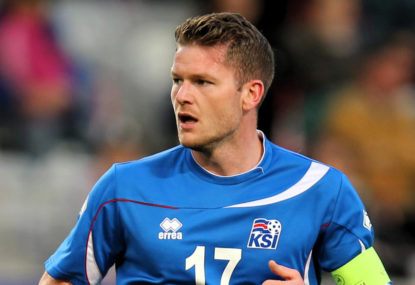WATCH: Mary Fowler nets an absolute screamer as Man City thrash Bristol
The Matilda scored the first two of her team's goals in the 4-0 win.

In the freezing north Atlantic, close to the Arctic Circle, there is a large island.
This island was insignificant and unknown for most of its history, mostly being known only for geographical trivia (the northernmost capital city, the country with no army).
However, in recent years, this island has been making itself known to the world, through a combination of armed economic disputes, quirky singers, financial crises, disruptive volcanoes. Now, more than ever, a national football team that punches far above its weight.
Iceland has always been good at soccer. The problem is there aren’t enough people.
Their population is roughly the same as the Australian Capital Territory’s (330,000). They have just 76 professional players to choose from. One of their managers is a part-time dentist.
The world ignored them, chalking them up as one of the filler nations in UEFA qualifying.
Things changed. In 2013, Iceland finished second in their World Cup qualifying group. To qualify for the tournament, they had to beat Croatia in a two-leg playoff.
The home leg, in Reykjavík, ended 0-0. There was excitement in the air. No country this small had ever made the World Cup. The current smallest was three times larger. If they scored, and didn’t lose, they were through to Brazil.
On a November night in Zagreb, Croatia won 2-0, crushing the part timers. That is what they were, predominantly. As they wrote in their excellent 2014 book Soccernomics, Simon Kuper and Stefan Szymanski comment that.
‘There can’t be many countries where the national team’s goalkeeper is also a professional filmmaker. Hannes Thor Halldórsson actually shot the commercial for Icelandair that featured his own team. “It was weird,” he told Sports Illustrated. “I had to act in the commercial as well, so I was directing the commercial in the national kit and boots.”‘
In 2015, they qualified for Euro 2016, second in their group, ahead of the Netherlands. Again, observers regarded them curiously, not out of fear of losing, but as a predator toys with its prey.
Things started off slowly, a surprise 1-1 draw against Portugal. Cristiano Ronaldo is on record as having said that they would go nowhere in the tournament.
A few days later, another draw against Hungary let people think they might sneak in as a third placed team. But that was before the now famous 2-1 win over Austria, with Gummi Ben’s outburst from the commentary box echoing the national sentiment.
They had booked themselves in for a round of 16 match against England. This was the greatest moment in the history of the sporting teams from that country.
Once, the two had played. England were victors, 6-1. After an early penalty, which England converted, it looked as if it might go the same way.
But things were different this time. Iceland were no longer the minnows they once were, and they scored two goals in the next fifteen minutes. Resolute defending for the rest of the match meant Iceland had sealed a memorable victory, one others thought beyond them.
David and Goliath, reimagined for the 21st century.
Much was made of England’s humiliation. Beaten by Iceland! But the real story was the success of the boys from the north, rather than English failure. And, given the meteoric success of their own Leicester City, the English should have known something like this could happen.
As all things do, it came to an end. A crushing defeat from the hosts France meant their brave run was finished. But they had won many fans, and the cold, windswept island now finds itself talked about equally with the rest of the world, as a formidable soccer foe, and also as a special place in the Universe.